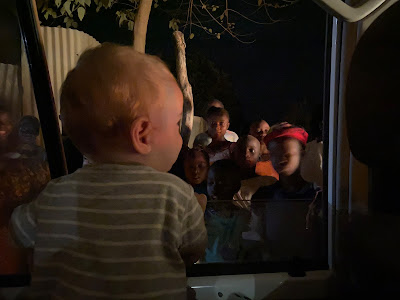We left the US on Oct. 26 and today is November 27. It’s been 4 weeks. An eventful 4 weeks.
It’s a long trip from door to door. You leave the US and it takes ~34 hours to get home. Rusty Oft, our board chair said, “it’s almost a week’s worth of a full time job just to get here!” And for us, having 2 kids makes it feel way longer than with 1 kid. We came back to a house with no well pump (it was stolen while we were gone), so we had no access to the water in our well. So we were back to bucket showers/flushes. Mold was everywhere: car, fridge, pantry, some of our clothes. Our car battery was dead. The battery charger at the hospital is dead. We borrowed a charger, couldn’t resuscitate the battery, so we had to buy a new one. We got a shipment of barrels from the US. It’s great to get stuff for the kids, but it’s a ton of work to unpack 6 suitcases only to immediately turn around and unpack 3x 50 gallon drums. James spent a couple of days and converted one drum to a composter. He’s also working on controlling his burnout, so they interviewed and hired a new assistant. Simeon is excellent, but it takes a lot of orientation to understand the complexity of the hospital.
About a week after we got back, two board members from Loma Linda came for an in person Board Meeting. James worked for days on his presentation and it’s always a flurry of activity to prepare for guests. The day after the meeting, they headed to Liberia for more board meetings at Cooper Hospital in Monrovia. On the way our hospital driver lost control and crashed our brand new (<4 months) donated Landcruiser into the ditch. One passenger broke both his legs. Another had a severe concussion. They are lucky to be alive. I barely saw James for 48 hours as he did damage control. He was doing medical consults in hotel rooms, filling out insurance forms, ‘translating’ what the orthopedic surgeons were talking about to church leadership at the Conference, Union, and Division.
To address our stolen well pump we have fundraised to extend our compound wall to enclose our well. We’ve had a lot of workmen walking through our compound during the construction. Suspiciously, twice in the last 10 days our compound has been broken into in the middle of the night and two 50 gallon drums have been stolen. Twelve foot walls, razor wire and a security guard feels like overkill until someone still manages to steal from us without anyone noticing until >12 hours later.
Yesterday, Sierra Leone went on “shelter at home” orders because a group had attacked the armory at the military barracks. The prison was breached and many inmates set free. We were safe during all of this and were too far away to hear the gun shots. Flights were cancelled for the day and many of our friends spent the whole day hearing gun fire and making escape plans while keeping their go-bag nearby. The streets are quiet today and there is now a nightly curfew in effect.
It has been a lot. And all of this on top of adjusting to being parents of two, a 3 month old that is struggling to handle the heat and constant noise, taking bucket showers, dealing with never-ending diarrhea in our newly potty trained newly-back-in-African-daycare toddler.
It also all happened in the midst of taking a volunteer to the beautiful, peaceful beach nearby, Thanksgiving with our dear friends here, and play dates with other families with children.
And this is just what has affected our life. The hospital continually churns with crazy cases and sick patients. We called the health department for a case that met the criteria to screen for Ebloa. They said “Great, draw some samples and we’ll be by in a few days to pick up the sample.” While we were back in the States one of our hospital staff lost his 2 year old when she became suddenly severely ill in our hospital. Another staff became involved in Black Magic saying she was cursed by a witch. She has pictures of the witch doctor treating her. Due to this she is separated from her husband and no longer has a job or way to pay her children’s school fees. We gave our laundry lady a loan to buy a phone which was then promptly stolen from a charging station she took it to. Whenever we get back to Sierra Leone there are so many people just waiting for us to come back to ask for help.
Sometimes it feels like we are under attack here - everything builds on itself: no water in the house, the constant begging from strangers, thieves in our compound, scary car accidents, violence in the streets, witchcraft, children dying. It feels heavy. It feels dark.
But we take comfort in this: The dark is not dark to God. God is hope. God is light, and we are not alone.
Psalm 139: 12: Even the darkness is not dark to you; the night is bright as the day, for darkness is as light with you.






